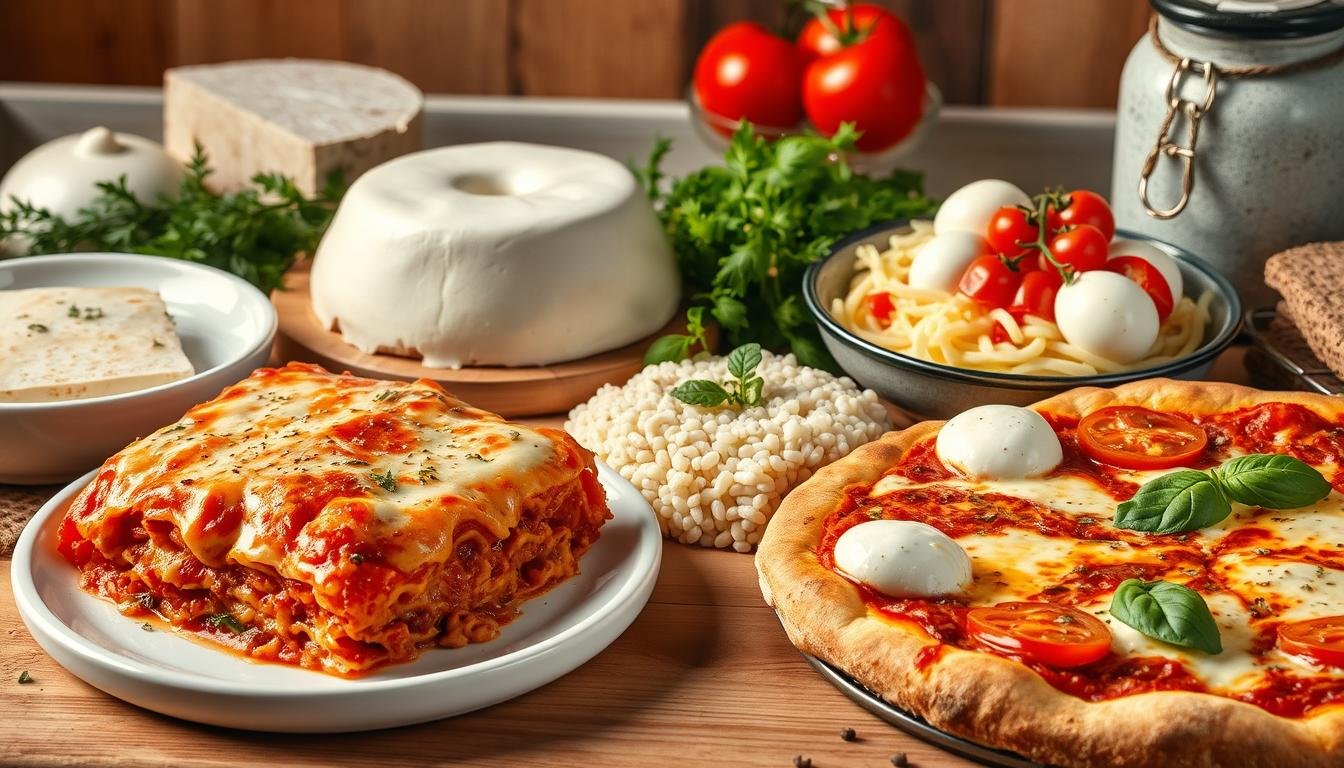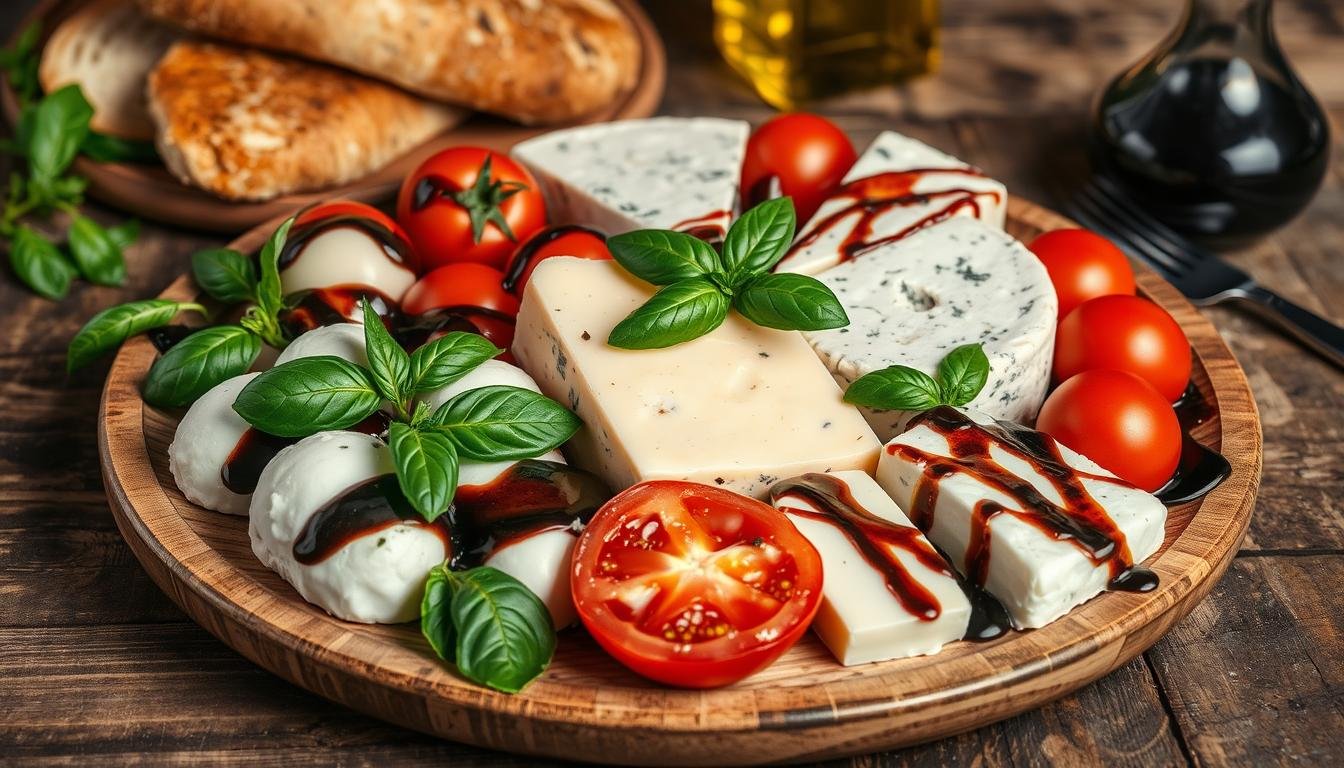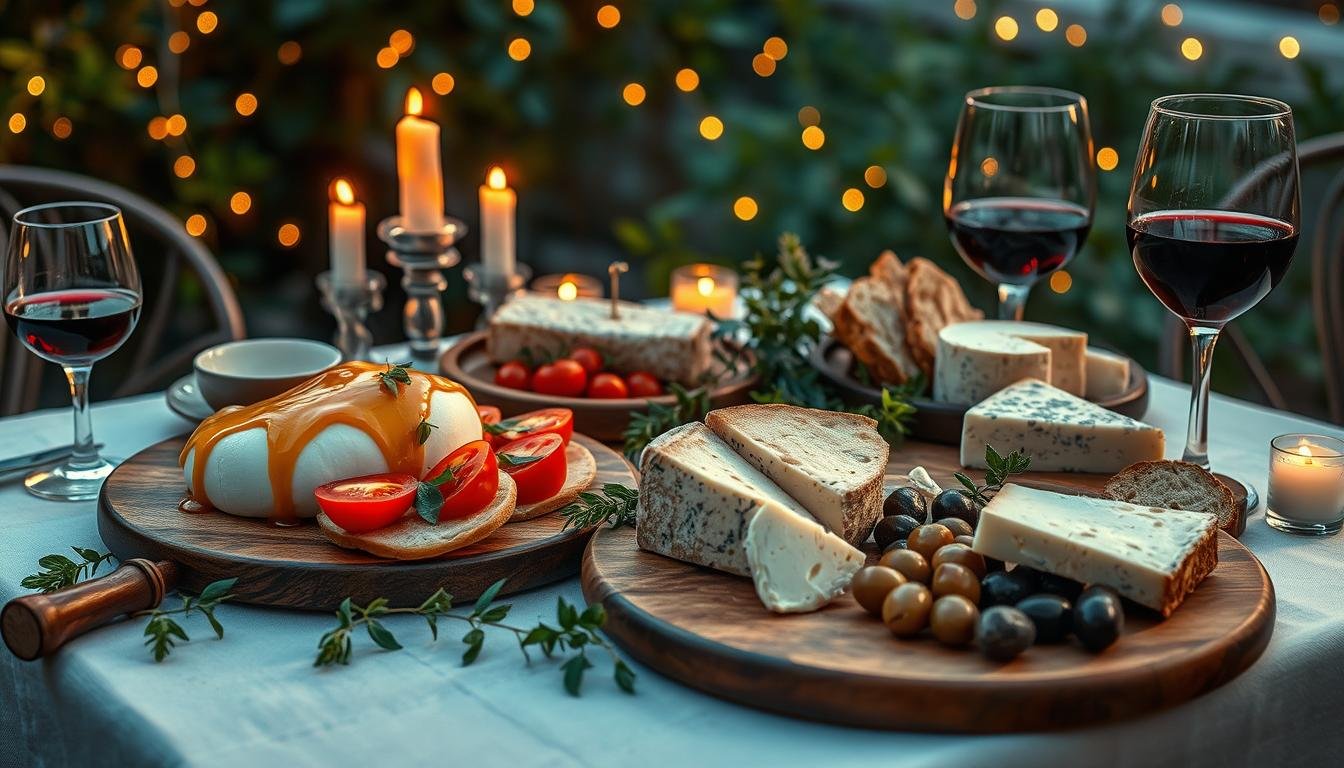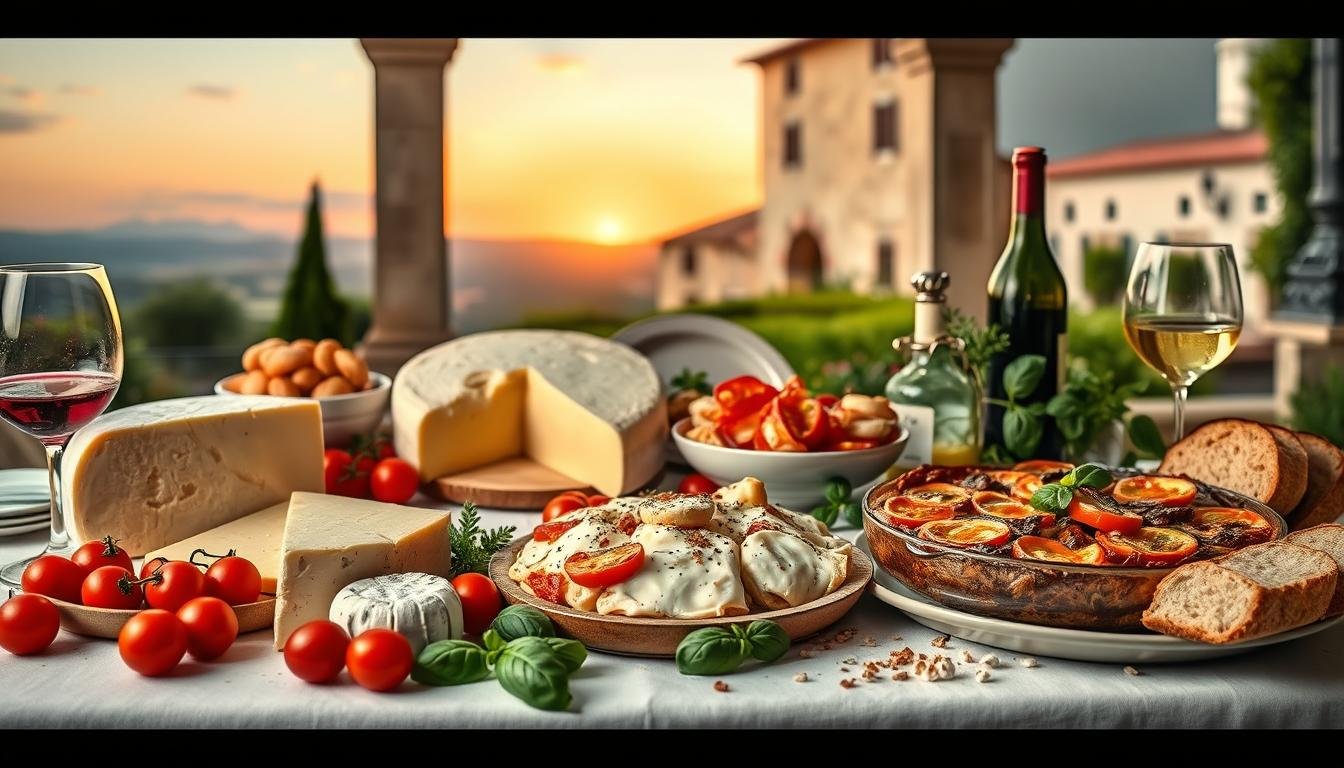Did you know seafood is a big deal in Italian cooking? Recipes like Zuppa di Pesce use clams, mussels, squid, shrimp, and cod. They bring out the Mediterranean’s true taste.
These dishes are loved for their flavour and are key to Italian traditions. They’re a big part of Christmas Eve’s Feast of the Seven Fishes. In this article, we’ll look at Italian seafood soups.
We’ll cover popular recipes, key ingredients, cooking methods, and regional differences. You’ll learn about Italian seafood soups and how to use Australian seafood in your stews.
Key Takeaways
- Explore the variety of ingredients in traditional seafood soups, including an assortment of seafood.
- Learn about the cultural significance of seafood in Italian cuisine.
- Discover essential cooking techniques for preparing delicious Italian seafood dishes.
- Understand the nutritional benefits of these wholesome meals.
- Incorporate local Australian seafood options effectively into your recipes.
- Find inspiration for serving and pairing your seafood soups.
The Rich Tradition of Italian Seafood Soups
Italian seafood soups are a big part of coastal living’s culinary heritage. They show how fishermen turned leftover catches into tasty dishes. These meals are simple yet complex, capturing the sea’s essence.
Historical Origins of Italian Seafood Soups
Seafood soups have a long history along Italy’s coastlines. They came from fishing communities needing to use all ingredients. Over time, these soups became famous historical seafood dishes that celebrate Italy’s sea heritage.
The Role of Seafood in Italian Cuisine
Seafood is vital in Italian cooking. Fresh fish and shellfish shape regional dishes, with each area having its own specialities. Seafood recipes reflect Italy’s culture and the ocean’s bounty, from cioppino to shellfish broths.
Popular Types of Italian Seafood Soups
Italian seafood soups are a big part of the country’s food culture. They show off a wide range of tastes and textures. Zuppa di Pesce, Italian-American Cioppino, and Minestone di Mare are among the favorites. Each soup has its own special flavors and ingredients, showing off Italy’s rich culinary heritage.
Zuppa di Pesce: A Culinary Classic
Zuppa di Pesce is a true taste of Italy’s coast. It’s a seafood soup with fresh fish and shellfish in a flavorful broth. The broth is seasoned with garlic, herbs, and tomatoes. It’s filled with mussels, shrimp, and calamari, making it perfect for a family dinner.
Cioppino: An Italian-American Inspiration
Cioppino comes from Italian fishermen in San Francisco. It’s a seafood stew with a mix of fish in a rich tomato broth. It includes squid, shrimp, and clams, adding to its flavor. It’s often served on special occasions, blending Italian and American tastes.
Minestone di Mare: A Nutritious Option
Minestone di Mare is all about health and taste. It’s a seafood soup with fresh veggies and seafood, boosting your health. It shows how Italian cooking can be both nutritious and delicious. Enjoying Minestone di Mare is like having a taste of the sea in a bowl.

Key Ingredients for Seafood Soups
To make a seafood soup that stands out, focus on combining different elements. Choose fresh seafood, aromatic herbs, and the right broth. These are key to getting the perfect taste.
Fresh Seafood Selections
Your seafood soup needs a variety of fresh seafood. Here are some great choices:
- 1 pound (454g) of mussels, scrubbed and checked
- 12 little neck clams, approximately 454g
- 3/4 pound (340g) of calamari, cut into 1/2″ rings
- 3/4 pound (340g) of cod or other white fish, cut into chunks
- 3/4 pound (340g) of extra-large shrimp, sizing at approximately u26
- A total of 2 pounds of assorted fish for depth in flavor
Aromatic Herbs and Spices
Italian herbs can make your seafood soup amazing. They add strong flavours and scents. Some top picks are:
- Parsley
- Basil
- Oregano
- Saffron for a hint of luxury
- Red pepper flakes for a touch of heat
Suggested Broths for Depth of Flavor
The right broth can make your seafood soup richer and more complex. Here are some good options:
- 2 quarts of chicken stock for a hearty base
- A seafood stock made from fish bones, benefiting your gut health with collagen and iodine
- Adding 1 cup (240g) of dry white wine enriches the broth
By picking quality seafood, using Italian herbs, and choosing the best broth, you’ll make a soup that’s both tasty and comforting.
Choosing the Right Seafood for Your Soup
Choosing the right seafood for your soup is key. Opting for sustainable seafood means you enjoy great taste and help the oceans. Australia has fresh, high-quality seafood thanks to its local ingredients. Knowing when to pick certain seafood can make your soup even better.
Sustainability in Seafood Selection
Choosing sustainable seafood starts with knowing its source. Look for certifications that show it’s caught or farmed right. This helps protect our oceans and supports local fishing communities.
Local Australian Seafood Options
Australia’s coast offers many seafood options for your soup. Some top picks are:
- Barramundi
- Whiting
- Prawns
- Mussels
- Clams
Using these local ingredients can make your soup fresh and lively.
Seasonality of Different Seafood Varieties
Knowing when seafood is in season helps you get the best. Barramundi is great in warmer months, and prawns are sweetest from November to January. Choosing seasonal seafood means better taste and quality in your soups. Here’s a table to help you pick the best seafood:
| Seafood Type | Peak Season |
|---|---|
| Barramundi | November to April |
| Whiting | Year-round |
| Prawns | November to January |
| Mussels | May to August |
| Clams | All year round, best in spring |

Essential Cooking Techniques for Seafood Soups
Choosing the right cooking techniques is key for seafood soups. It affects both flavour and texture. Knowing how to cook seafood and build flavours makes your soup better. Timing is also crucial for tender results.
Sautéing Seafood vs. Poaching
Sautéing seafood like shrimp or clams adds flavour and texture. It’s quick, perfect for tender ingredients. Poaching seafood gently in broth keeps it moist and delicate. Pick the method based on the seafood and your soup’s taste.
Building Flavour with a Base
A strong flavour base is essential for seafood soup. Start by sautéing onions until they’re golden. This boosts the flavour. Add garlic, tomatoes, or broth for more taste. Clam juice adds depth, and seasoning as you cook enhances it.
The Importance of Proper Timing
Cooking seafood needs careful timing. Clams and shrimp cook fast, while soups take longer. Overcooking makes seafood tough. Use medium to large shrimp for the best taste. Watch for clams to open to check if they’re done.
| Seafood Type | Cooking Method | Cooking Time |
|---|---|---|
| Clams | Poaching | Until they pop open |
| Shrimp | Sautéing | 5 minutes or less |
| Salmon | Sautéing / Poaching | Check for tenderness |
| Firm White Fish | Poaching / Sautéing | Approximately 10-15 minutes |
Mastering these cooking techniques will make your seafood soup amazing. Use fresh ingredients, manage timing, and play with flavours. This will make your soup a hit with everyone.
Regional Variations Across Italy
Italy’s geography greatly influences its seafood soups. Each coastal area showcases its unique flavors and cooking styles. This highlights the country’s rich culinary heritage.
Coastal Regions and Their Specialties
Seafood soups in Italy vary by region. For example, Neapolitan zuppa di pesce uses a strong marinara sauce with fresh seafood. Tuscan cacciucco, on the other hand, combines many fish and shellfish, following a tradition of using at least five types.
In the Adriatic, brodetto celebrates the sea with its own special touches. These touches reflect the local tastes of the area.
Northern vs. Southern Italian Styles
Northern and Southern Italy have different seafood styles. Southern dishes are known for their bold flavors and spices, reflecting the Mediterranean’s zest. Northern soups, by contrast, often include freshwater fish and creamy elements, fitting the cooler climate.
This difference shows how seafood soups are deeply rooted in local traditions and ingredients.

| Region | Specialty Dish | Main Ingredients |
|---|---|---|
| Campania | Zuppa di Pesce | Seafood, Marinara Sauce, Garlic, Parsley |
| Tuscany | Cacciucco | Multiple Fish, Shellfish, Tomatoes, Wine |
| Adriatic Coast | Brodetto | Fresh Fish, Spices, Olive Oil |
| Puglia | Zuppa di Pesce | variety of seafood, San Marzano Tomatoes, Peperoncino |
Vegetarian and Vegan Alternatives
Seafood soups are a big part of Italian cuisine. But, you can make them vegetarian or vegan with the right ingredients. This way, you can enjoy the taste of the sea without using animal products.
Plant-Based Seafood Options
Tofu and seaweed are great for vegetarian seafood substitutes. Tofu takes on different textures and tastes, making it perfect for soups. Seaweed adds a sea-like flavour.
Lentils are also great for vegan soups. Brown or green lentils keep their shape, while red lentils become soft and creamy. This makes them ideal for soups.
Creative Vegan Broths and Base Flavours
For depth in your soups, try plant-based broths. Use roasted vegetables, herbs, and spices. Vegan Italian soups often include garlic, olive oil, and fresh herbs like parsley and basil.
These ingredients make your soup rich and satisfying. Canned San Marzano tomatoes add a sweet and juicy base. This boosts the overall flavour of your soup.

Serving Suggestions for Seafood Soups
To make your seafood soup better, serve it with things that go well together. You can choose the right bread or wine to pair with it. Each choice helps make your meal more enjoyable.
Perfect Pairings: Breads and Wines
For a great match, try the best breads for seafood like ciabatta or sourdough. They’re perfect for dipping and add texture. Pair your soup with a crisp Italian white wine, like Pinot Grigio or Verdicchio.
These wines balance the seafood’s richness. If you prefer red, a light Gamay or chilled Chianti is a nice contrast.
Enhancing Presentation and Aroma
How you present your seafood soup matters. Add fresh herbs like parsley or basil for colour and scent. A bit of lemon zest can also brighten the dish.
These touches make your soup look and smell better. They make your meal more enjoyable. Try these ideas to impress your guests and make your gatherings special.

Popular Garnishes to Elevate Your Soup
Adding thoughtful garnishes to seafood soups can change both taste and look. Toppings not only make the soup look better but also add new flavours. Here are some great options to make your seafood soups stand out.
Fresh Herbs and Citrus Zest
Chopped herbs like chives, cilantro, dill, or parsley add a fresh taste. A sprinkle of citrus zest brightens the soup, making it more refreshing. Try lemon and lime zest for a zesty touch. Adding a bit of sour cream or crème fraîche adds creaminess.
Croutons vs. Toasted Bread
Crunchy textures are key for garnishing seafood soups. Homemade croutons offer a nice crunch, while toasted bread is a great match. The right bread complements the soup, letting you soak up the broth. Toasted nuts or seeds add extra crunch and flavour.

| Garnish | Description |
|---|---|
| Yogurt/Sour Cream | Provides creaminess and can be flavoured with harissa or pesto for added depth. |
| Vegetable Slices | Thin slices of radish or julienned carrot add visual appeal and freshness. |
| Citrus/Spices | Citrus zest and spices complement seafood beautifully, enhancing the overall flavour. |
| Toasted Seeds/Nuts | Produce a textural contrast; consider pumpkin seeds or butter toasted pecans. |
| Potato Chips | They offer a unique and crunchy topping option for a fun twist. |
| Crunchy Coconut Chips | Ideal for soups with tropical or warm spice elements. |
Using these toppings will make your seafood dish even better. Each garnish brings its own special touch. You can try different ones to find your favourites.
Tips for Meal Prep and Storage
Preparing and enjoying seafood soups is easier with good planning and storage. Knowing how to prep your soup can make your meals better. It also keeps your soup safe and tasting great.
Freezing Your Seafood Soup
To keep your soup fresh, store it in airtight containers. This way, you can enjoy it later without losing its flavour. Here are some tips for freezing:
- Let the soup cool down before putting it in containers.
- Write the date and what’s inside on the containers.
- Don’t fill containers too much, leave room for expansion.
Reheating Techniques for Best Taste
Using the right reheating methods is key to keeping your soup tasty. Here’s how to reheat your seafood soup:
- Put the soup in a saucepan and heat it slowly.
- If it’s too thick, add a bit of broth or water.
- Stir it now and then to heat it evenly without overcooking the seafood.
Quick methods like microwaving might not be the best. A slow reheating keeps the seafood’s flavours and textures intact. This way, you’ll always have a great meal.

Incorporating Local Australian Flavours
Mixing Italian cooking with Australian tastes adds depth to seafood soups. It also brings new and exciting dishes. Using local ingredients, you can make unforgettable meals that celebrate both cultures.
Unique Ingredients from Australia
Australia’s diverse nature offers special ingredients for seafood soup. Think about adding:
- Finger limes for a zesty pop.
- Macadamia nuts for a creamy texture.
- Kangaroo meat as an unexpected twist.
- Sea lettuce as a nutritious garnish.
These ingredients give your soup a distinctly Australian flavour. Fresh, local seafood like barramundi or prawns make each bowl full of authenticity and taste.
Fusion Ideas for a Unique Twist
Creating unique Australian seafood recipes means blending cooking styles. Try sautéing local seafood with Italian herbs like basil and oregano. Or, simmer your soup with Italian tomato base and Australian bush tomato for a tasty fusion.
| Italian Technique | Suggested Fusion Idea |
|---|---|
| Sautéing | Combine barramundi with finger lime and local herbs. |
| Simmering | Add bush tomatoes to an Italian tomato broth. |
| Grilling | Char local seafood before adding to the soup. |
By trying these fusion ideas, you’ll make seafood soups that honour Italian cuisine and celebrate Australian tastes. Enjoy the journey of combining these flavours in your kitchen.

Where to Find Authentic Recipes
Exploring authentic Italian seafood recipes is a thrilling adventure. Many resources are available to help you dive into these dishes and techniques. With the right materials, you can bring those tasty flavours into your own kitchen.
Recommended Italian Cookbooks
When searching for top seafood cookbooks, focus on those that showcase regional and traditional recipes. Here are some key ones:
- Essentials of Classic Italian Cooking by Marcella Hazan – A must-have, showcasing various seafood dishes.
- Italian Seafood by Maria Zoë – Focused solely on seafood preparation, it features an array of authentic recipes.
- Cucina Classica by Carla Capalbo – Offers a blend of classic and modern seafood soups from different Italian regions.
Online Platforms for Recipe Inspiration
Along with cookbooks, online platforms are rich with seafood soup recipes. Some top sites include:
- Bon Appétit – Provides a variety of seafood soup recipes with user-friendly instructions.
- Food52 – A vibrant community where home cooks share their best seafood preparations.
- Epicurious – Features thousands of seafood-related recipes, highlighting flavor combinations and innovative dishes.

Hosting a Seafood Soup Night
Make your next gathering unforgettable by hosting a seafood soup night. Choose dishes that are both flavourful and comforting. You can impress your guests with soups inspired by Italy and pair them with perfect matches. Think about how you’ll set up to create a welcoming atmosphere for your seafood dinner.
Menu Ideas and Pairings
Plan a menu that offers a variety of seafood soups. Each dish should highlight different ingredients and styles. Here are some ideas:
- Cioppino: This hearty dish serves 6 and combines local seafood in a delightful white wine and tomato broth. Pair with crusty sourdough bread for dipping.
- Seafood Bisque: A smooth, luscious soup made with white fish, a medley of shellfish stock and a hint of saffron. Serve with French bread spread lightly with butter.
- Zuppa di Pesce: This traditional Italian fish soup can be enriched with a selection of seasonal seafood. Offer a light, chilled white wine as a pairing.
Customise your seafood selection based on what’s fresh at the market. This ensures a delightful experience for all. Leftover cioppino can be turned into a tasty pasta sauce the next day.
Atmosphere and Setup Tips
The ambiance you create is just as important as the food. Here are some tips for setting up for your seafood dinner:
- Use themed decor, such as nautical elements or fresh seafood displays, to enhance the dining experience.
- Enhance the mood with warm lighting and delightful Italian music. This combination brings the feel of a quaint trattoria right to your home.
- Arrange seating to promote conversation, perhaps at a long table for a communal feel.
With careful planning and a delicious menu, hosting a seafood soup night will be a memorable event for everyone.
Nutritional Benefits of Seafood Soups
Seafood soups are a tasty and nutritious choice for your meals. They are full of important nutrients. This makes them great for your health and fun to make.
Health Benefits of Seafood
Seafood is known for its nutritional value. It has lots of protein and not much carbs. Shrimp, lobster, and tilapia are not just yummy but also packed with vitamins like Vitamin K and B Vitamins.
Seafood also gives you omega-3 fatty acids and minerals like zinc. A seafood stew can have up to 49.3 grams of protein. This makes it a filling and healthy meal.
Balancing Flavours and Nutrients
Balancing nutrients in soups is all about the right mix. Seafood, fresh veggies, and a good broth make a tasty and healthy soup. For example, mussels add texture and taste without much carbs.
Make your broth ahead of time to keep it fresh. A well-made seafood soup is not just tasty but also good for you. It’s a great choice for anyone looking to eat well.
| Nutrient | Value per Serving |
|---|---|
| Calories | 476 |
| Sugar | 4.6g |
| Sodium | 1007mg |
| Fat | 23.6g |
| Saturated Fat | 6.6g |
| Carbohydrates | 14.3g |
| Fiber | 2.9g |
| Protein | 49.3g |
| Cholesterol | 224.5mg |
Exploring Wine Pairings with Seafood Soups
Wine pairings for seafood soups can make your meal even better. The Fontaleoni Vernaccia di San Gimignano DOCG is a top choice. It’s a white wine with a crisp taste that goes well with seafood soups.
This wine is perfect for dishes like brodetto, a Tuscan seafood stew. It’s filled with flavours from shrimp and calamari.
Best Italian Wines for Pairing
There’s more to Italian wines than just Vernaccia. Rosso di Montalcino DOC is another great option. It has a fresh taste with red fruit notes.
This wine is made from the Sangiovese grape. It adds depth and flavour to your seafood soups. The secret to great pairings is finding the right balance between the soup and wine.
Understanding Your Personal Preferences
Finding the right wine is all about personal taste. Try different Italian wines to see what you like. Whether you prefer white or red, exploring different pairings can make your meal better.
The goal is to enjoy your meal more. It’s not just about matching the wine with the soup. It’s about enjoying the whole experience of Italian cuisine.





